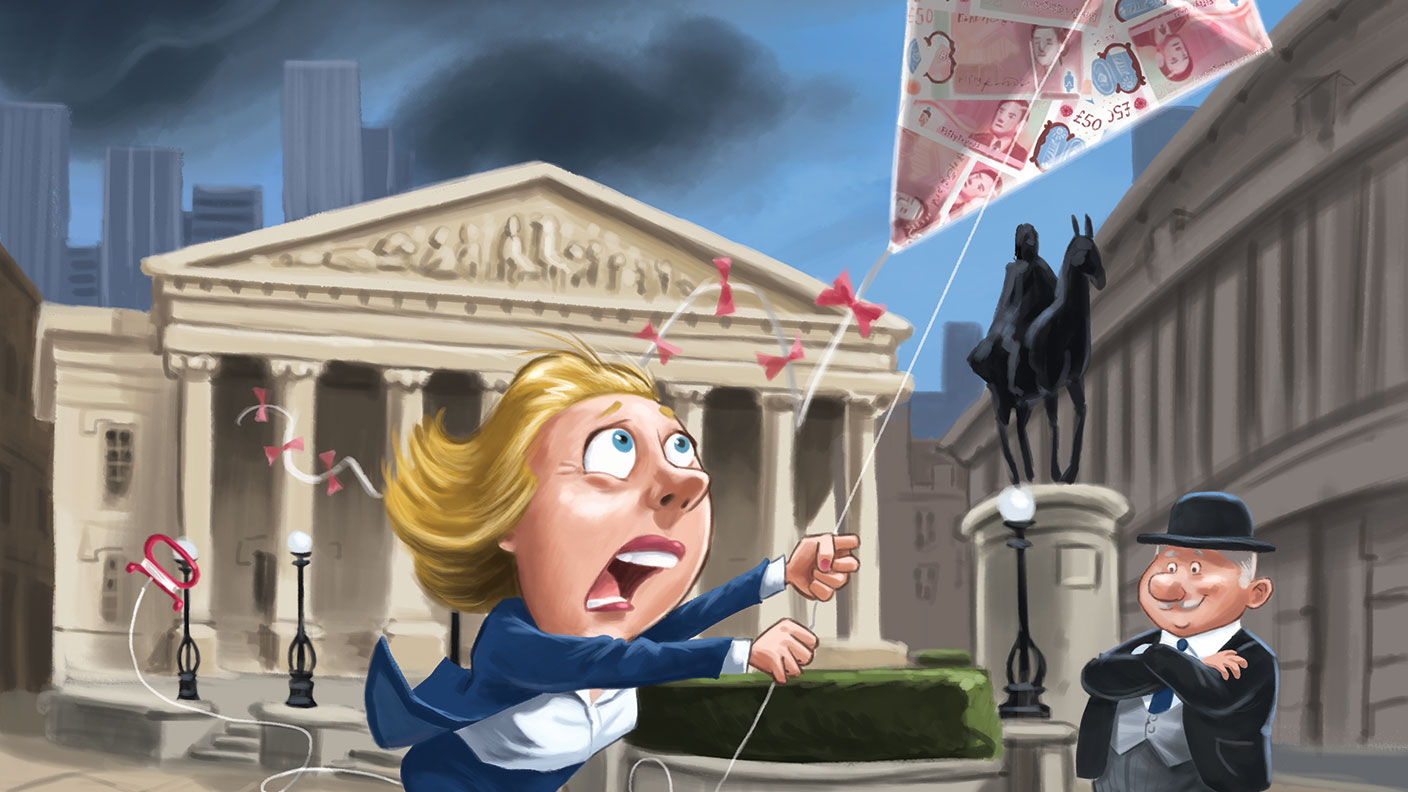Will David Cameron be good for your wallet?
David Cameron's victory was the best result for investors. But expect some stealth taxes in the wake of the election, says John Stepek.

Get the latest financial news, insights and expert analysis from our award-winning MoneyWeek team, to help you understand what really matters when it comes to your finances.
You are now subscribed
Your newsletter sign-up was successful
Want to add more newsletters?

Twice daily
MoneyWeek
Get the latest financial news, insights and expert analysis from our award-winning MoneyWeek team, to help you understand what really matters when it comes to your finances.

Four times a week
Look After My Bills
Sign up to our free money-saving newsletter, filled with the latest news and expert advice to help you find the best tips and deals for managing your bills. Start saving today!

David Cameron's victorywas the best result for investors, but expect some stealth taxes in the wake of the election, says John Stepek.
The result of last Thursday's general election pleasantly surprised markets. Sterling bounced, as did stocks, and gilt yields fell (if briefly). Two things pleased investors: a decisive result that avoided months of uncertainty and perhaps even a second election, and the fact that a broadly business-friendly party had won. In all, it was the most investor-friendly outcome available.
Of course, as we've pointed out several times, regardless of the result, the economy is still in trouble. Our national debt is around 90% of GDP (evenusing official figures, which ignore all manner of longer-term liabilities). Academics will tear each others' throats out arguing over exactly how much this impacts on future growth, but it's certainly very much on the high side and ideally should be a lot lower.
MoneyWeek
Subscribe to MoneyWeek today and get your first six magazine issues absolutely FREE

Sign up to Money Morning
Don't miss the latest investment and personal finances news, market analysis, plus money-saving tips with our free twice-daily newsletter
Don't miss the latest investment and personal finances news, market analysis, plus money-saving tips with our free twice-daily newsletter
Perhaps more importantly, we're running a deficit (an annual overspend)of more than 5% in other words,we're still adding to the national debt at a rate of knots, despite our growing economy. For perspective, earlier this year, Brian Caplen, editor of The Banker, described the UK as having gone from "being close to meltdown [in 2009] to a situation that is merely dreadful".
On the upside, the Tories have made tackling Britain's balance sheet a priority. On the downside, they don't have any clear plan (not one they've revealed to the electorate at least) and it's hard to see where to begin. And as Caplen notes, the challenge of making the books balance is just the start. But our issues go far deeper.
The UK "is an ageing society with pension, welfare and healthcare systems that are wrongly structured and financially unsustainable". There's no sign of policies "that would change the game or re-engineer' the economy".
That means two things.Firstly, we might see harder spending cuts than in the last two years in an effort to get the pain over before the run-up to 2020. It's hard to know exactly where these cuts will fall or what impact they'll have. If the Tories have any long-term vision, they'll get on with sensible reforms to Gordon Brown's tax credits system, which has probably done more to distort incentives for working people than anything else it may even play a big role in Britain's poor productivity by encouraging participation in the "shadow" economy. We'll soon find out when George Osborne delivers his first post-election budget and spending review later in the year.
Where will the tax sting land?
Secondly and this is probably of more immediate concern to investors, because you can do something about it it also means tax hikes. Prior to the election, the Conservatives committed to avoid increasing VAT, income tax or national insurance. They also effectively promised to raise the inheritance tax threshold to £1m, via a new "family home" allowance. But they need to raise money from somewhere.
During the last parliament they proved rather adept at this as The Daily Telegraph pointed out, "stealth taxes" and careful use of "fiscal drag" (where tax thresholds rise slowly, if at all, meaning more people pay higher rates) helped the last government boost the overall tax take to record levels.
Expect more of the same this time round. If you look at the taxes that they haven't promised to freeze, one glaring omission is capital gains tax (CGT). It has been raising around £4bn a year, but last year that jumped to £5.8bn and prior to the financial crisis managed about £7.5bn. So it can be a significant revenue raiser, if nowhere near the levels of income tax or VAT.
As Gary Heynes of Baker Tilly notes: "with changes to the system and growth in the economy, maybe the government could be eyeing a return to those heydays"? CGT also largely impacts on the better off, and it's less visible than a hike in income tax in other words, a near-perfect stealth tax.
As it stands, the basics of CGT are that everyone has an annual allowance of £11,100. Over and above that, any capital gains the main exemption is on the sale of your primary residence, ie, your house are taxed at 28% (for higher-rate taxpayers) or 18% (for lower-rate taxpayers). What could change? As Heynes points out, we could see a higher headline rate of CGT potentially aligning it with income tax, "especially for short-term speculative gains".
In other words, the faster you "flip" an asset, the more CGT you'd have to pay, with the level "tapering" off the longer the ownership period. More radically, the Tories could start to extend CGT to primary residences in the UK, perhaps starting with houses above a certain value. That would also dovetail well with the government's aim effectively to remove family properties of up to £1m from the IHT net. Imposing CGT on primary residences sold for over £1m is unlikely to lose the Tories any votes (there's no election for five years and in any case, what's the alternative?) and it's arguably more practical than a mansion tax would have been.
There's not much you could do about CGT on primary residences that's the beauty of the tax but one of the best ways to protect your investments from any new tax changes is to put your money into a pension, or to use your individual savings account (Isa) allowance each year money saved in an Isa is free of CGT and income tax, and that's unlikely to change anytime soon. Where possible, it's also worth looking at ways to use your annual £11,100 CGT allowance in case it's taken away.
The investment implications
So that's the bad news. The good news is that, while the UK's balance sheet is messy, underlying economic conditions are still favourable, and combined with a business-friendly government that should be a net positive for Britain's companies. The government is committed to reducing corporation tax and making sure it has the lowest rate in the G7 group of countries. And as Allister Heath notes in The Daily Telegraph, the pro-market new business secretary Sajid Javid is the "polar opposite" of Vince Cable, his Lib Dem predecessor.
His goals include cutting red tape and boosting the export sector. The various sectors that had suffered as a result of political uncertainty (including utilities, tobacco, and property companies) have already bounced back to a great extent, and may benefit further.
But you will probably find better bets among smaller companies. They are generally more exposed to the UK's domestic economy than the multinationals that dominate the FTSE 100, and as a result should benefit more in the long run from a more business-friendly environment. And as broker Charles Stanley notes, smaller and mid-cap stocks are currently cheaper than FTSE 100 stocks (if you exclude troubled mining, oil and finance plays). That's unusual, because smaller stocks historically trade at a premium.
The potential for a quantitative-easing-driven recovery in the eurozone a big market for the UK's companies also means that the outlook for earnings "is very supportive". And with companies still sitting on lots of cash, merger and acquisition activity is likely to keep buoying markets.
You could opt for a simple FTSE 250 tracker, but this is one of those cases where we think it may be worth paying a little more for active management in the form of a decent investment trust. There are a few trusts we like in the sector. These include Montanaro UK Smaller Companies (LSE: MTU) (for full disclosure, MoneyWeek editor-in-chief Merryn Somerset Webb sits on the board of another Montanaro investment trust, European Smaller Companies). This trust invests in small London-listed firms, and trades at a 15% discount to net asset value (NAV). Put simply, you can buy £1-worth of underlying assets for 85p.
Another trust we've considered for the MoneyWeek investment trust portfolio in the past is the Henderson Smaller Companies Trust (LSE: HSL) this trust has more of a mid-cap bias and trades at a 10% discount to NAV. Also keep an eye out in MoneyWeek later this month for Merryn's interview with small and mid-cap specialist, Miton's Gervais Williams, whose funds are also worth considering.
The constitutional juggling act
Two major issues threaten to hang over the government for the duration of this parliament the question of Europe, and the question of Scotland. From an investor's point of view, the big threat from Scotland is fiscal.
We don't know exactly how the Scottish National Party (SNP) will affect life in Westminster. Cameron has a majority large enough to ignore any demands or threats if necessary. But at the same time, a move towards more devolution both for Scotland and perhaps regionally seems likely.
The big risk lies in any changes that deliver more fiscal powers to Scotland (or any other devolved region) while landing the UK government with responsibility (directly or implied) for the bill. Added spending powers without added responsibility for borrowing or taxing to fund them are a recipe for trouble for sterling and the gilt markets. We're not keen to invest in gilts anyway they look overvalued but this is something to keep an eye on.
As for Europe, it seems certain that we'll see a referendum on European Union (EU) membership, and it may even be pulled forward to 2016 from original plans for 2017. Cameron has made it clear that he'd prefer Britain to stay in the EU he'd rather negotiate better terms for Britain on issues such as immigration and the right to opt out of elements of EU legislation, for example. It remains to be seen how much support he can muster for that stance from the eurosceptic wing of his party, and much will depend on how receptive the rest of Europe is.
There will be plenty of arguments over the economics of "Brexit" on either side, much of which is pure ideology and so needs to be taken with a heap of salt (Roger Bootle of Capital Economics gave what we'd say is a sober eurosceptic view of why Britain should leave the EU). We suspect that while it may unnerve individual sectors or companies, a disruptive break up of the UK is more of a threat than Brexit. In fact, the biggest threat from Brexit is probably the internal strife it could unleash within a Conservative government that remains dependent on a slim majority.
Get the latest financial news, insights and expert analysis from our award-winning MoneyWeek team, to help you understand what really matters when it comes to your finances.

-
 MoneyWeek Talks: The funds to choose in 2026
MoneyWeek Talks: The funds to choose in 2026Podcast Fidelity's Tom Stevenson reveals his top three funds for 2026 for your ISA or self-invested personal pension
-
 Three companies with deep economic moats to buy now
Three companies with deep economic moats to buy nowOpinion An economic moat can underpin a company's future returns. Here, Imran Sattar, portfolio manager at Edinburgh Investment Trust, selects three stocks to buy now
-
 Governments will sink in a world drowning in debt
Governments will sink in a world drowning in debtCover Story Rising interest rates and soaring inflation will leave many governments with unsustainable debts. Get set for a wave of sovereign defaults, says Jonathan Compton.
-
 Why Australia’s luck is set to run out
Why Australia’s luck is set to run outCover Story A low-quality election campaign in Australia has produced a government with no clear strategy. That’s bad news in an increasingly difficult geopolitical environment, says Philip Pilkington
-
 Why new technology is the future of the construction industry
Why new technology is the future of the construction industryCover Story The construction industry faces many challenges. New technologies from augmented reality and digitisation to exoskeletons and robotics can help solve them. Matthew Partridge reports.
-
 UBI which was once unthinkable is being rolled out around the world. What's going on?
UBI which was once unthinkable is being rolled out around the world. What's going on?Cover Story Universal basic income, the idea that everyone should be paid a liveable income by the state, no strings attached, was once for the birds. Now it seems it’s on the brink of being rolled out, says Stuart Watkins.
-
 Inflation is here to stay: it’s time to protect your portfolio
Inflation is here to stay: it’s time to protect your portfolioCover Story Unlike in 2008, widespread money printing and government spending are pushing up prices. Central banks can’t raise interest rates because the world can’t afford it, says John Stepek. Here’s what happens next
-
 Will Biden’s stimulus package fuel global inflation – and how can you protect your wealth?
Will Biden’s stimulus package fuel global inflation – and how can you protect your wealth?Cover Story Joe Biden’s latest stimulus package threatens to fuel inflation around the globe. What should investors do?
-
 What the race for the White House means for your money
What the race for the White House means for your moneyCover Story American voters are about to decide whether Donald Trump or Joe Biden will take the oath of office on 20 January. Matthew Partridge explains how various election scenarios could affect your portfolio.
-
 What’s worse: monopoly power or government intervention?
What’s worse: monopoly power or government intervention?Cover Story Politicians of all stripes increasingly agree with Karl Marx on one point – that monopolies are an inevitable consequence of free-market capitalism, and must be broken up. Are they right? Stuart Watkins isn’t so sure.